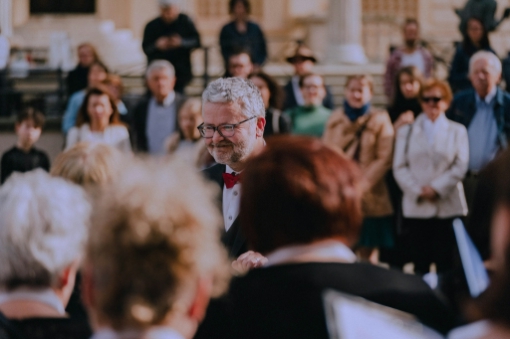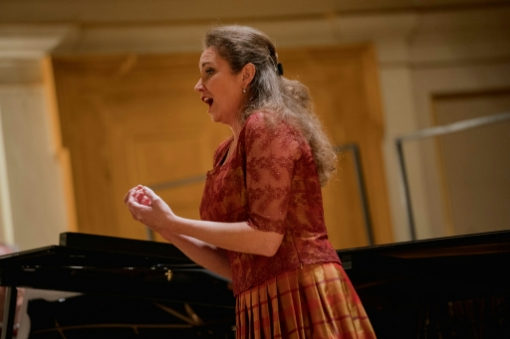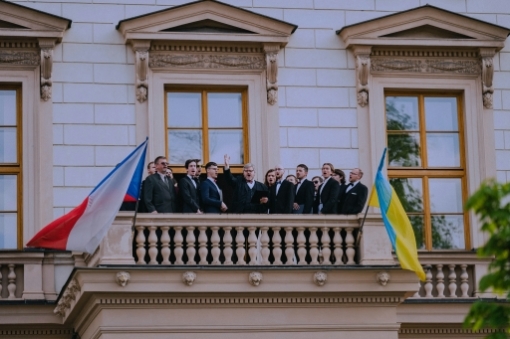The Brno Philharmonic’s headquarters and one of Brno’s most important historical and cultural landmarks – the Besední dům – celebrates its 150th anniversary this year. Exactly on 3 April 1873, when the auditorium (great hall) of the building designed by architect Theophil von Hansen, author of the famous Musikverein in Vienna, was ceremonially opened, this magnificent building became the centre of Brno’s culture and its distinctive artistic life. A century and a half later – on Monday 1 May 2023 – an afternoon gathering and a subsequent concert entitled When Smetana First Played in Brno. . . will launch a series of concerts that pay tribute to unique milestones in the city’s cultural history.
The first of these, as the title of the opening evening suggests, was a concert commemorating Bedřich Smetana’s performance on 16 June 1873 at the Besední dům. The opening afternoon, during which the choirs Beseda brněnská with choirmaster Petr Kolař and Láska opravdivá under the direction of Jan Špaček performed in the courtyard of the Besední dům, took place at five o’clock. Even before that, however, the singing of the choir Láska opravdivá attracted passers-by from the balcony of the building.

The official opening was thus taken up at 5 pm by the Beseda brněnská with the chorale Jesus bleibet meine Freude from Johann Sebastian Bach’s cantata Herz und Mund und Tat und Leben, followed by the song for voice and piano (Petr Kolař) Caro laccio, dolce nodo by Francesco Gasparini. The solo part was taken by tenor Richard Kolař. There was nothing to fault with the choral singing – the members of Beseda brněnská are intonationally unified and dynamically balanced. Gasparini’s song, from the very edge of the concert, introduced an extremely talented singer, whose technical, dynamic, and expressive possibilities represent great promise for the future. The young singer’s very pleasant voice colour and excellent articulation also play into his favour. The block of Brno’s Beseda brněnská with songs and choral works –which included classical numbers such as Va, pensiero, sull’ali dorate from Verdi’s Nabucco or Prayer from Oskar Nedbal’s opera “Polish Blood” – was fittingly concluded by the choir in “Let us Rejoice, Let’s be Merry” (Proč bychom se netěšili) from Bedřich Smetana’s “The Bartered Bride”.
From the courtyard, the programme moved to the foyer of the Besední dům, where the singers of the male choir Láska opravdivá under the direction of Jan Špaček performed with the Bedřich Smetana choirs. The concert opened with Heslo I – II on the text by Josef Srb-Debrnov while the following composition Věno was also from his pen. The Láska opravdivá choir, however, did not only appear before the concert itself, but also during the interval and after the concert, so that in addition to Smetana’s choirs, the works of Pavel Křížkovský, Josef Bohuslav Foerster, and at the very end of the evening also Leoš Janáček could be heard. The performance of the pieces corresponds to the high standard of the choir – the singers are intonationally and rhythmically united, they have a refined feeling for the choral works they are engaged in, and the staging itself was dynamically varied and worked well with gradations.
At seven o’clock in the evening, the visitors moved into the Besední dům hall and the main part of the programme began, which was opened by Návrat plavců for the mixed choir of François Bazin, arranged by Karel Bendel. This also opened the concert from 16 June 1873 (the centenary of Josef Jungmann’s birth), which inspired Monday evening’s When Smetana First Played in Brno. . . . Brno has a long tradition of choirs and their mutual cooperation; Brno choirs have joined forces on many occasions, and this was no different. During the evening, not only did the aforementioned choirs Beseda brněnská and Láska opravdivá perform, but they were also joined by the Academic Mixed Choir Pečman, which – like Láska opravdivá – is led by Jan Špaček. Bazin’s Návrat plavců was performed in a combination of Láska opravdivá and Pečman. The staging was of high quality, the layering of voices were balanced, and the dynamics were top rate.
The mighty choir was replaced by Vendulka’s fragile aria Hajej můj andílku … Letěla bělounká holubička from Smetana’s opera “The Kiss” (Hubička) performed by soprano Pavla Vykopalová and pianist Igor Ardašev. The lyrical arias performed by Pavla Vykopalová are practically a guarantee of a profound musical experience – as a soprano, she is able to work with maximum musical understanding with the colour of her voice and the emotional colouring of the musical phrases without expressing pathos or pandering. The singer’s phrasing, as well as her work with dynamics or decorating the tone, always serves to emphasize a particular emotional charge. Igor Ardašev was a sensitive support for the singer, with his playing effectively accentuating her interpretation.

Pianist Igor Ardašev was then given the opportunity to present piano compositions by George Frideric Handel, Frédéric Chopin, and Bedřich Smetana. The first performance was Handel’s “Air with Variations” from his “Suite in E major”, which also refers to the 1873 concerto. Ardašev took the movement soberly and without unnecessary romanticization, which would rather harm the work. For the following “Nocturne in E major”, Op. 62 No. 2 by Frédéric Chopin, on the other hand, he chose a significantly more emotional setting in accordance with the interpretive logic of the work. Ardašev’s performance in the first half of the evening concluded with a trio of Smetana’s polkas – “Polka No. 2 in E minor” from “Memories of Bohemia in Polka Form”, “Polka No. 2 in A minor” from the first series of Bohemian Dances and “Polka No. 3 in F major” also from the first series of Bohemian Dances. Although these works by Smetana did not appear in the original concert, they correspond thematically to the dramaturgy of the evening. It was on three completely different positions (Handel, Chopin, Smetana) that Ardašev’s technical proficiency, as well as his work with expression, phrasing, and overall musical understanding, was best demonstrated.
The second half of the evening opened with the cantata První májová noc for mixed choir with a piano accompaniment by composer Josef Drahorád to words by Karel Jaromír Erben. This piece also appeared on the original programme from 1873. It was performed by Beseda brněnská, conducted by Dagmar Kolařová with Petr Kolař at the piano. The soloists were tenor Richard Kolař and soprano Veronika Kladivová. Drahorád’s piece is a pleasing, colourful and well-structured form that constantly returns to the main musical theme. Here again the performance was of a high standard and the individual voice sections were suitably graded to each other in terms of dynamics and expression. Richard Kolař once again confirmed his vocal qualities, and Veronika Kladivová boasted a penetrating but soft tone with precise diction and purposeful work with expression.
As in the first half of the evening, the chorus was replaced by a lyrical aria. This time it was Mařenka’s aria Ach, jaký žal … Ten lásky sen from Smetana’s “The Bartered Bride”, again performed by Pavla Vykopalová and Igor Ardašev. This aria was perhaps even more heartfelt than the previous one and once again, it was polished technically and emotionally, both by Vykopalová and Ardašev, who – again in the spirit of the first half – continued with his own solo performance in the form of a concert paraphrase of Franz Liszt on the motive of the opera Rigoletto by Giuseppe Verdi. It was here that Ardašev was able to showcase his technical mastery the most – Liszt’s paraphrase is full of demanding runs, fast figurations, melodic leaps, and dramatic changes in dynamics and tempo. It must be added that the pianist handled even the most challenging parts with complete ease, which was particularly admirable in the fast but flawlessly articulated runs.
All three choirs joined forces at the very end – Leoš Janáček’s Ukvalské písně – under the direction of Petr Kolař. Although one might expect that the different histories and professionalism of the participating ensembles might have influenced the final staging, the three choirs performed in perfect harmony. It was an energetic end to a rather long but artistically nourishing afternoon. And the main celebrations are yet to come – the Brno Philharmonic has prepared not only history-inspired concerts to celebrate the 150th anniversary of its headquarters, but also an international musicological conference, a light installation in the courtyard, an exhibition of Hansen’s designs in cooperation with the Moravian Gallery, and the premiere of the Czech Television documentary “I, Besední dům”. This venerable building is simply celebrating, and it will certainly be worth it!
FRANÇOIS BAZIN “Návrat plavců” for mixed choir
BEDŘICH SMETANA Hajej můj andílku … Letěla bělounká holubička, Vendulka’s aria from the opera Hubička (The Kiss)
GEORG FRIDERIC HÄNDEL Air with Variations from Suite in E major HWV 430
FRÉDÉRIC CHOPIN Nocturne in E major Op. 62 No. 2
BEDŘICH SMETANA:
Polka No. 2 in E minor from the cycle Remembrance of Bohemia in Polka Form Op. 12
Polka No. 2 in A minor from the 1st series of Bohemian Dances
Polka No. 3 in F major from the 1st series of Bohemian Dances
JOSEF DRAHORÁD První Májová noc, cantata for mixed choir with piano and harmonium accompaniment (ad lib)
BEDŘICH SMETANA Ach, jaký žal … Ten lásky sen, Mařenka’s aria from the opera The Bartered Bride
FRANZ LISZT Rigoletto, concert paraphrases on themes from Giuseppe Verdi’s opera
LEOŠ JANÁČEK Ukvalské písně for mixed choir on texts and tunes of Ukvalské folk songs
Igor Ardašev piano
Pavla Vykopalová soprano
Brno Philharmonic Choir Beseda brněnská
choirmaster Petr Kolař
Pečman Academic Mixed Choir
Láska opravdivá Male Choir
Choirmaster Jan Špaček
Monday 1 May 2023
Besední dům
































No comment added yet..